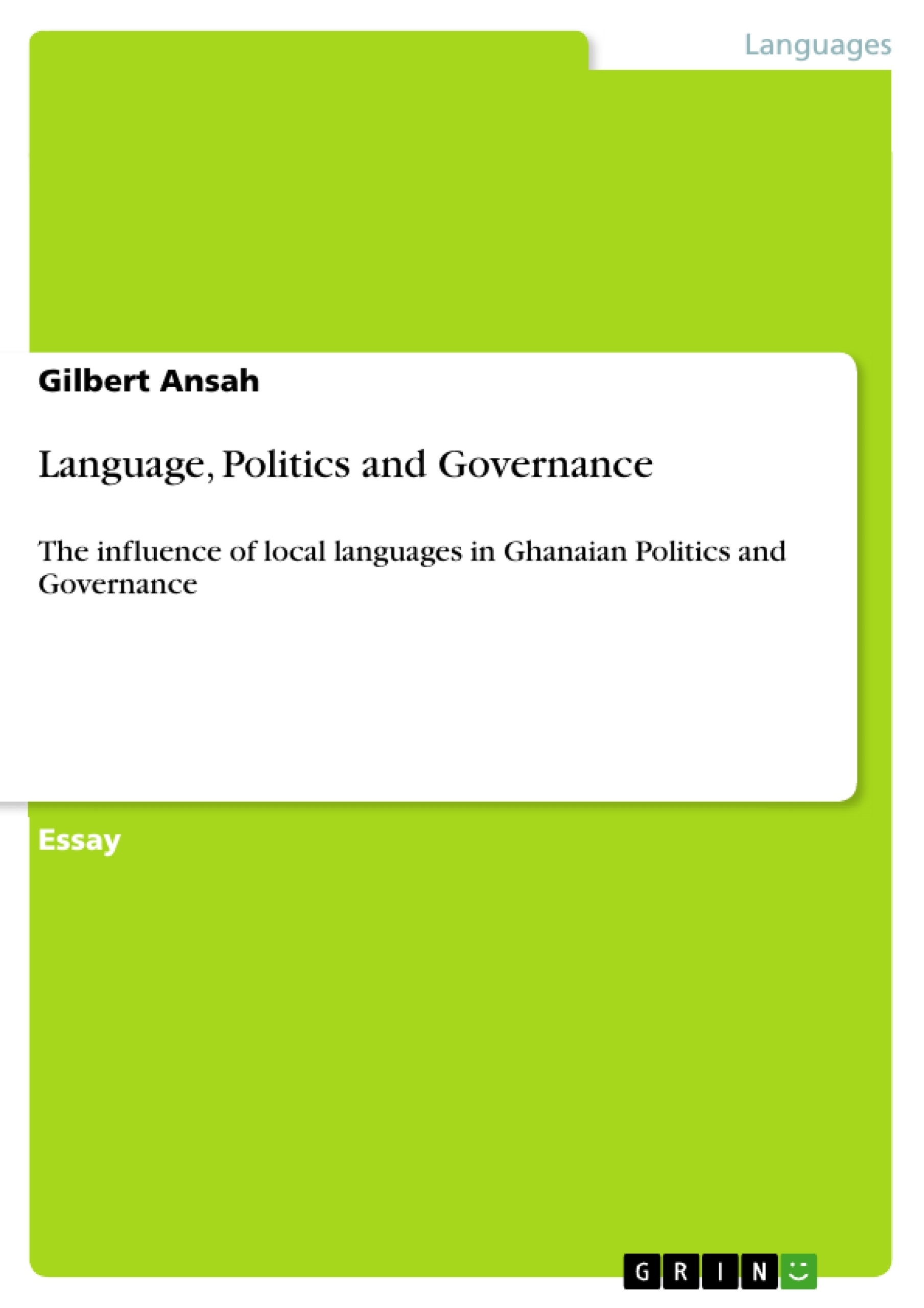This Essay analyzes the influence of major ethnic languages in the Ghanaian phase of politics and Governance. It employs a detailed qualitative research approach to explain how local languages in Ghana cannot be sidelined in political activities as well as governance.
Language is a very vital tool in human existence. Serving as the basis of communication, it is undoubtedly needed for every human act and according to Lal and Suri, language is man's finest asset. This then implies that there cannot be human existence without language, the basis of communication. Just as many countries across the globe are multilingual, Ghana is too. With about 100 ethnolinguistic groups, all further divided into numerous cultural and linguistic units, the major languages include Akan, Ewe, Dagbani, Ga and Nzema.
All these languages, together with all others that have not been mentioned tend to define who Ghanaians really are. As such, the nature of politics in the country is partly built on the use of language particularly, the local languages which include the above mentioned languages as well as the various dialects used in the country.
Inhaltsverzeichnis (Table of Contents)
- Language, Politics and Governance: The Influence of Local Languages in Ghanaian Politics and Governance.
- Introduction
- The Influence of Local Languages in Ghanaian Politics
- Presidential Campaigns and Elections
- Parliamentary Elections
- The Influence of Local Languages in Ghanaian Governance
- Legislative Matters
- Judicial Matters
- Civil Servants
- Acceptance Levels of Local Languages in Ghanaian Politics
- Conclusion
Zielsetzung und Themenschwerpunkte (Objectives and Key Themes)
This research paper aims to analyze the influence of local languages, specifically Akan, Ga, and Ewe, on Ghanaian politics and governance. It examines the role of these languages in various aspects of the political system, including presidential and parliamentary elections, legislative proceedings, judicial processes, and the activities of civil servants.
- The impact of local languages on electoral campaigns and outcomes.
- The role of local languages in legislative debates and decision-making.
- The use of local languages in the Ghanaian judicial system.
- The significance of local languages in the interactions between civil servants and the public.
- The evolving acceptance levels of local languages in Ghanaian society.
Zusammenfassung der Kapitel (Chapter Summaries)
The introduction provides context by highlighting the importance of language in human communication and the multilingual nature of Ghana. It specifically focuses on the influence of local languages in shaping Ghanaian politics.
The first chapter delves into the influence of local languages on Ghanaian politics, analyzing their role in presidential campaigns and elections as well as parliamentary elections. It explores how candidates' fluency in local languages can impact their electoral success.
The second chapter examines the influence of local languages in Ghanaian governance, focusing on legislative matters, judicial processes, and the operations of civil servants. It examines how these languages are used in different spheres of government activity.
The third chapter discusses the acceptance levels of local languages in Ghanaian society, analyzing their increasing use in public spaces and institutions. It explores both the arguments for and against the widespread adoption of these languages.
Schlüsselwörter (Keywords)
The key concepts explored in this research paper include local languages, Ghanaian politics, governance, elections, parliamentary proceedings, judicial processes, civil servants, language policy, and societal acceptance.
Frequently Asked Questions
What is the main focus of this research on language and politics in Ghana?
The research analyzes the influence of major local ethnic languages, such as Akan, Ewe, and Ga, on Ghanaian politics and governance, specifically looking at elections and legislative proceedings.
Which local languages are considered most influential in Ghana?
The major languages mentioned include Akan, Ewe, Dagbani, Ga, and Nzema, which define the cultural and linguistic identity of various ethnic groups in the country.
How does language impact presidential campaigns in Ghana?
A candidate's fluency in local languages can significantly impact their electoral success, as it serves as a vital tool for communication and connection with the voters.
What role do local languages play in the Ghanaian judicial system?
The paper examines how local languages are utilized in judicial processes to ensure better understanding and participation within the legal framework.
Are local languages accepted in official Ghanaian governance?
Yes, the research discusses the evolving levels of acceptance and the increasing use of local languages in public institutions, legislative debates, and interactions with civil servants.
Why is language considered "man's finest asset" in this context?
Language is viewed as the basis of human existence and communication, making it an indispensable tool for political activity and effective governance.
- Arbeit zitieren
- Gilbert Ansah (Autor:in), 2017, Language, Politics and Governance, München, GRIN Verlag, https://www.grin.com/document/463432



